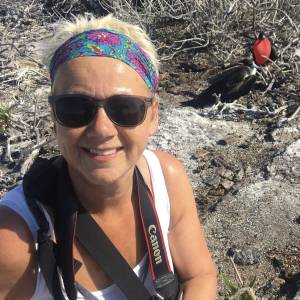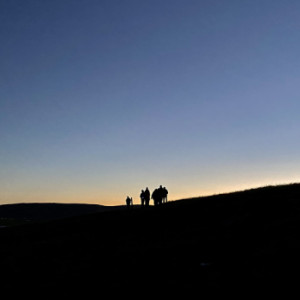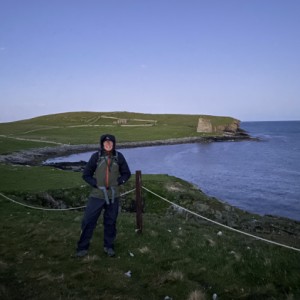Shetland - 1.30am
It’s just after 11.00 pm when we arrive at Sandwick to check-in for the storm petrel trip to Moussa. It’s certainly not dark, but in the shadow of the western hills, it’s dim and decidedly cold despite the day’s sunshine. People are dressed for an Arctic expedition, bulked up in layers, huddled in hoods or woolly hats.
We make our way to the boat and set off towards the island of Moussa - a short ten minute crossing, but made more dramatic by the lateness of the hour and the heavy cross swell rocking the boat ominously. Of course, we land safely, the forty of us descending on the shore much to the bewilderment of a lone kayaker who clearly thought he had the island to himself for the night.
We have been given torches, but by now the night is light enough for us to walk with ease across the rough ground. Our leader is the boat’s skipper, and he takes us across the island to the ancient broch, stopping at intervals to regale us with stories of Moussa’s past - one of my favourites being that of the laird’s alcoholic wife who far from gaining sobriety isolated here, was regularly supplied with gin by Dutch smugglers. It’s a place heavy with history and folklore.
We start to learn about the storm petrels who nest here in huge numbers, and learn that listening to walls is not a sign of madness here. Passing an old dry stone wall, we listen out - and there it is: the amazing purring - churring - sound of storm petrels nesting in the cavities. It’s magical.
Eventually, we reach the broch itself - the birds’ prime nesting site. He tells us more - about the huge distances they travel, their longevity, their increasing numbers. It’s all fascinating, but of course it’s just the prologue to the main event.
By now it’s midnight, and there’s still no sign of the returning petrels. The walls of the ancient broch, however, are alive with churrings and clickings; the stones, it seems, are alive. In small groups we can enter the broch itself - wearing masks of course. Outside, it’s still relatively light, but within the broch’s tower a gloom descends and we manoeuvre carefully over the uneven floor. Here, and on the outer walls, we can shine our red torch beams to look for birds, and a strange pattern of soft red spotlights can be seen playing on the stones.
But there are still no birds returning. By now it’s 12.15. Apparently 12.30 is the latest time for first arrivals - but tonight the sky is cloudless and light does not appear to be diminishing. Small wonder the petrels do not think it’s dusk. And by now the cold is beginning to gnaw through all those layers……
Finally, as 12.30 approaches, a few dark flutterings are seen as the first arrivals skim over the sea and seem to almost scurry over the walls to find the correct nest where they can take over domestic duties and allow their mate to undertake their own long distance feeding foray.
Gradually, the numbers of returning birds increase and the churring from the walls reaches fever pitch. There are more to come - we’ve not seen the full force yet, but as 1.00 am approaches, it’s time to start the trek back to the pier. Despite the time, it’s still light enough to see our way quite clearly. The sky is just amazing, a narrow band of burning orange pressed to the horizon dispersing into yellow light.
We reach the boat, and chug across the passage back to port, and just before we reach land, the moon rises over the sea. The perfect ending.
And so we head back through the ‘simmer dim’ of endless day to sleep - and dream of walls that vibrate with the churring sounds of storm petrels.
The following link gives more information on these birds and includes video which gives an idea of the sounds referred to.
https://www.shetlandtimes.co.uk/2020/09/02/mousa-storm-petrels-travel-hundreds-of-miles-to-find-food
My main is the boat returning from Moussa at 01.30, with extras of G returning from the broch at 01.00, and a silhouette of some of the group on the island at the same time.



Comments
Sign in or get an account to comment.


